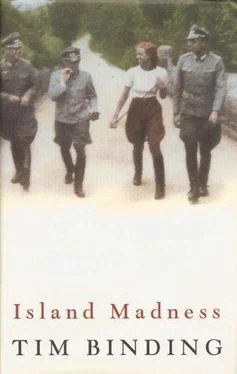“Till tomorrow, then.”
He is not hot but he feels the heat of the sun. He is not thirsty but he imagines the pitiless depth of the desert on his cracked lips. He wants to embrace the world but his hands have lost all sense of touch; he wants to look out onto visions of grace but there is only a lumpen grey mass moving before him. He never loved anything as much as his constructions, never felt for his flesh and blood the way he did for his bricks and mortar. He could fashion those latter materials, mould them, break them in his hands. He could lean over his desk at night and see them outlined on the transparent paper; he could walk in loam and clay and watch the ground give birth to their skeletal form. He had not bothered with buildings to house mortal men. His were monuments to power, to organization, orchestrating the ceaseless trudge of humanity. It was movement he had craved, movement and design, and this island had seen some of his greatest creations. He had shaped the white Observation Towers in one of which he now sits; he had welded the eagles’ nest gun emplacements onto the granite grip of rock; he had let loose the great swim of concrete upon the land. How he had loved those grains, the powdered weight of it lying in the sack, the thick slop of it churning in the mixer, pouring out grey and glutinous into wet, waiting moulds. What a revolutionary mixture it was, what deceptive strength lay in those unassuming seeds, how soft they seemed, how easily they hardened, what creations they spawned. And like all living things it could only spring to life after water’s hydrogen kiss. In his youth he had worked on a packet steamer and had stood once on its creaking deck watching the ice world of Greenland gliding past and he knows that concrete possesses the same treacherous beauty. Like the rush of an avalanche it can cover the landscape in one swoop, obliterating dip and hollow, inventing new worlds of flattened beauty. It is hard and impenetrable but is able to bend its shape. It possesses both depth and resonance, and though he has seen instances of decorated concrete, most notably in the concrete house of Norfolk, Home Place, where the surface is studded with flint and clay tiles and local brown stone, he prefers his concrete unmasked, with only the pattern of the wooden board marking its austere exterior. Concrete should be naked, unashamed. It should stand in defiance of the elements. It is the product of a new age, a powdered miracle. Man will be dwarfed by its power, its dormant energy. They will wander among its pillars and frescos and marvel at its unremitting strength. They will stand in awe listening to the echoes of their own tiny footsteps vanish in its great booming hollows. There will be cities of concrete, he knows it, cities with stadiums and railway stations and vast temples to new religions; there will be housing complexes, ranged over the ground like the spokes of a wheel, long rows of rectangular flat dwellings, two, possibly three storeys high, each equipped with a window box and a little balcony from which mothers can watch their children pushing scooters on the concrete paths below. Planes will land on concrete, ships will doek alongside concrete. The land will be crisscrossed by great ribbons of it, on which hundreds, nay thousands, of black blunt-nosed cars will run; free movement, free power and thus freed desire. Thought as action. Action as design. It is just the beginning. In a drawer under his draughtsman’s desk there lies a plan of the islands and the mainland and, joining them, two concrete bridges rising high above the sea, one from Cap de Carteret to Jersey, the other, further up the coast, from Flamanville to Guernsey, for when the war is over, those who have carried out His instructions will need to take themselves, their fiancées, their families, to a place of recreation and rest, where they may walk and tumble and gather strength. What better haven than these small islands, where everything can be tuned to their needs, Jersey for officers and high government officials, Guernsey for the other ranks? He had shown Dr Todt his design late one evening, and before the doctor could raise the obvious objection, had admitted that by its very nature the project would consume a high percentage of the labour force needed. “But think of it,” he had declared, “the longest bridge in the world built solely that the good and industrious might be rewarded.” Todt had warmed to the idea, reminding him of that other discussion they had taken part in, during his official visit to England in ‘37, and their meeting with the Minister of Transport. There had been talk of a bridge across the Channel then, and, ever the visionary, Todt had suggested that the enterprise should be seen not simply as a matter for England and France but as a European concern. The Minister had been polite but evasive, and later van Dielen realized that he should have taken this false enthusiasm as a warning against the British and their myopic view of the world. He should never have attached himself to England, he had reflected, he should have moved straight back to Europe. When they were discussing the coming weeks that night over dinner, with Ernst holding his glass in their air as if he could see the future whirling in the sparkling liquid, in a moment of rare frankness, he had shared his notion with Ernst, hoping that he might pass it on to Speer, whom he knew only slightly, but Major Ernst had looked at him strangely and said, “What makes you think that the traffic will be from the Continent? From England I think, and not for a holiday.” He did not understand then, and he chooses not to understand now.
He has spent his days in the Observation Tower above Gull Rock, near where his daughter was found. The tower is hollow and silent. There is no one working here now, nor will there be for the next few weeks. Over at Choet it’s a different matter. The watchtower there will have men crawling in and out like bees in a hive.
There are five levels to these towers, and unlike their defensive predecessors, built in another age, they face almost exclusively to the sea, ignoring any danger that might emerge from the hinterland. Only from the roof, reached by an awkward twenty-foot climb, can one see an uninterrupted three hundred and sixty degrees. The island, say the towers, is ours. There is no danger within. Each floor looks out onto a different level of sea, viewed through long curving slits which elongate the seascape. The ocean looks wide and flat, squashed into a solid vertical plane. Paradoxically, for these are direction-finding towers, built to enhance the accuracy of the guns, the overall effect is to distort distance.
Since he has been here he has observed nothing, least of all direction. It has rained almost constantly with an accompanying thick mist. Waking that first morning it was as if he had been born again into a cocooned world of white, a fairyland of floating spirits, and when the wind came and blew away a veil or two, the water appeared as elusive, shimmering silver, chemical, amniotic. He is becalmed, floating like a baby, standing by the aperture hoping to see the soul of his daughter float past, lying on the roof waiting to hear the beat of her heart coming from the looming flap of a gull, white on the wing. He wants nothing now but for the island to have an eternal untouched life, and for him and those he has lost to be a part of that eternity. But this perturbs him, for he worries that within the structures he has built, there might lie a fatal, undetected weakness, similar to the one which must have run through his family life. Either that or the island harbours some grudge against him. But why? What has he done? Has he not woven round it a most marvellous protective shell, one which will keep the sea at bay for a hundred years? Is not the island made whole? Is it not tended and watered and kept in good order as never before? And what was asked from it in return? Nothing but that it might take his family to its bosom. He tries to remember the colour of his wife’s eyes or the first time Isobel spoke but he cannot. He tries to picture his daughter as a little girl, running barefoot in an Egyptian courtyard, but though he can see the chickens scattering in her wake he cannot see her or even detect the sound of her voice above their flapping squawks.
Читать дальше












